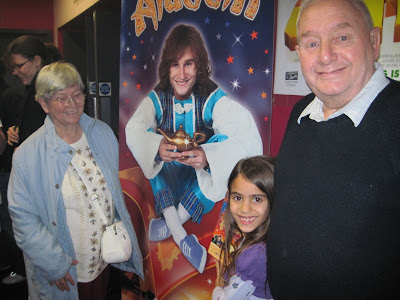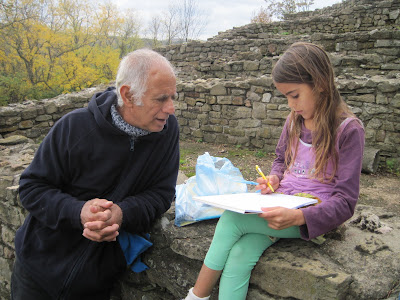
As I mentioned in a previous post, sadly all five of our chickens were attacked and killed one night, and we never got a single egg out of any of them... so as you can see, with regard to keeping chickens I still have a lot to learn. When we return to Bulgaria next summer we shall have a serious rethink before we buy some more, bearing in mind one or two things we have learnt from experience.
Our first mistake I think was buying them too young. It's true, they're very cute (and cost a little less), and it's really fun having them around, but if the whole idea is to eventually get eggs out of them then it's worth buying them old enough to (1) tell what sex they are ;-) and (2) get them as close to egg-laying age as possible. Out of our 5 it turned out that only two of them were females!
Another mistake we made was buying them in two batches. First we bought three (a male and two females it later transpired) - and they always got on well together although there was a definite pecking order and the male always got first pickings at the food. A month or two later we bought two more (males as it turned out) and they were always the lowest down in the hierarchy. For a while they all slept together at night, but as the males got bigger there were fights between them so we split them up: the two young ones together, and the three older ones together.
One evening in the half-dark, we mistakenly thought they were all in the right places, so we locked their cages and in the morning we discovered that one of the younger males had inadvertently got locked in with the older male and had been relentlessly pecked by him until he was bleeding from the neck and wing and breathing laboriously. I was pretty sure he was going to die but when I let them out he seemed to perk up and after a day was running around again as usual. But from then on I was careful to make sure that they didn't get locked up together again. A couple of weeks later I found that they were again in the same cage - the little one right in the corner and I couldn't persuade him to come out so I decided not to lock them in that night, but to leave the door open so that the little one would have somewhere to run to if he was attacked. The next morning all was fine. No sign of any squabbles and in fact I had had a bit of a lay-in because they had all got out by themselves at dawn and didn't squawk their heads off as they usually did for me to come and unlock them. So I thought (very mistakenly as it turned out): "Why bother to lock them in at night? They have plenty of places in the open barn to perch and each one can find his own space.... and I won't have to get up at the crack of dawn to let them out." That was the night they got attacked.
The attack began at about 3 am - I heard a terrible squawking from the barn and went out to see what was up. I turned on all the outside lights and saw three of the chickens staring madly, petrified, into the darkness of the back yard. Then silence - I guessed that whatever it was had been frightened off by the lights and I went back to bed. About an hour later: the same terrified screams, only this time I was beginning to feel a bit wary myself and reluctant to go out - maybe I too would be attacked? At 5 am, a third and final round, this time closer to house, and the noise woke up Lielle. Suddenly we both saw the sillouette of an animal on it's hind legs peering in at our bedroom window. "What's that monster?" asked Lielle. "It's only a cat", I reassured her, but in my mind I was questioning what kind of cat is that big that it can peer in at our window.
The next morning we discovered the carnage - three headless chickens and two were missing completely. The neighbours told us they thought it was maybe a skunk or a pine marten, and when we checked out pictures of both on the internet the one that looked most like the 'monster at the window' was the pine marten. You can check what he looks like here and here. He actually looks quite cute, and in most parts of the world their populations are declining and they are a protected species.















